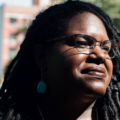The Black Woman Body as Life, Land & History: on adrienne danyelle oliver

In her powerful new poetry chapbook, collective madness, acclaimed poet adrienne danyelle oliver positions her own Black woman body as representative of women suffering from reproductive health issues, especially where her body suffers microaggressions by a medical establishment that reflects the white supremacist legacy entrenched in this country. With vivid imagery, oliver compels her readers toward an intimate understanding of how seemingly innocuous moments can hold the power of constant triggers, and how oliver’s body is never quiet to memory wherever she finds herself in this country’s past and present.
“:a poem about fibroid tumors” examines the cold medicalization of her own body as a continuous experiment that holds disastrous results, not just on one’s physical health, but the deleterious effects on the psyche as well. oliver traces this pain to the cleaving from the Motherland continent:
the black woman body carries Afrika
in her womb
and this womb remembers
cargo of bodies
waiting to be crucified
or set free
The meticulous craft of splicing or crumpling up words demonstrates the dissection of oliver’s own Black body—as well as the medical establishment’s prevalent attitude to treat Black bodies as a monolithic experiment and diagnosis. She viscerally examines her own reproductive condition, not just in the present context, but she places the overall wellbeing of her uterus in a historical context. The result is an understanding of how the white lady doctor in the poem operates as an extension of the white supremacist authority that still holds Black women’s bodies—and Black bodies in general—as public property.
oliver discusses the reception of treatment between a white lady doctor versus a Black lady doctor in “:black and white,” where she recognizes that compassionate medical care is not guaranteed by the sameness of one’s own race. Rather, oliver recognizes how inferior treatment toward a Black patient isn’t only a matter of white doctors acting in concert. She asks, how do we as individuals, regardless of race, perpetuate and contribute to the systemic treatment of Black bodies being governed as less than human?
not to overgeneralize because i can remember another time in my life when a black woman doctor did not have the best bedside manner.
In “:well-intended white folk,” oliver traces her metaphors back to greater historical traumas as she describes a white couple who arrives at her apartment to pick up her cherished cherry wood writing desk, given away via a freecycle ad. In the midst of the white husband disassembling her desk for transport, he casually lays a hand on her bed “to lift himself back up to standing,” which triggers oliver to think “about family stories of white men / putting their hands on our beds”—the rape of enslaved women by their white oppressors. Personal objects in oliver’s residence suddenly become bodily extensions of herself, as if she were being taken apart limb by limb.
She acknowledges her own powerlessness when it comes to advocating for herself and her fertility while simultaneously acknowledging the reproductive injustice in this country that continues to minimize Black women, Black mothers, their agency, and their bodies—“about how many black mothers / die in childbirth / in hospitals / after living a whole lifetime in midwives’ hands”—while also minimizing their families and their communities through police brutality, gun violence, and the socioeconomic conditions systemically created for them to remain disadvantaged.
In her poem, “:echo,” oliver describes receiving her fibroid diagnosis from her doctor:
she explains tenderly that attacks harden the blood into an endometrioma a six-syllable word foreshadowing a fifth surgery
From “echo,” I was reminded of the dehumanizing experimentation and countless surgeries—without anesthesia—performed on enslaved women such as Anarcha, Betsey, and Lucy, who are the uncredited mothers of modern gynecology. oliver’s poetry echoes how the medical profession, with the exception of oliver’s doctor who is kind and a Black woman herself, can oftentimes still lack the sensitivity and compassion when providing care to Black patients today.
Similarly, I was reminded of medical advancements that continue to be achieved at the violation and expense of Black women and their families. There is, of course, the case of Henrietta Lacks, a cervical cancer patient in 1951 whose cells were extracted non-consensually, without her or her family’s knowledge, during a biopsy at Johns Hopkins Hospital. Her cells are still being used for medical research without compensation to her descendants despite biotechnology and other pharmaceutical companies that continue to profit from her cells.
In fact, that way of conceptualizing Black women’s bodies is not a thing of the past. World-renowned champion Serena Williams penned her own revelations of medical malfeasance and gross neglect in a 2022 Elle article titled, “How Serena Williams Saved Her Own Life.” Williams revealed the perilous ordeal she faced at the hands of medical staff after giving birth to her daughter in 2017. Despite her status, Williams as a Black woman still had faced a life-threatening situation as medical staff didn’t initially respond to her persistent pleas for a bilateral CAT scan of her lungs—even after she had informed them of her medical history for being high risk for blood clots. When her doctor finally complied, the tests revealed that immediate surgery was necessary to break up a blood clot in her lungs and prevent it from fatally reaching her heart.
“In the U.S., Black women are nearly three times more likely to die during or after childbirth than their white counterparts,” William wrote. “Many of these deaths are considered by experts to be preventable. Being heard and appropriately treated was the difference between life or death for me; I know those statistics would be different if the medical establishment listened to every Black woman’s experience.”
In order to reclaim the Black woman body as life and land itself, oliver concludes her slim collection with a powerful metaphor that evades the white, antiseptic language that has time and time again defined the enslaved body and the African continent. Instead, oliver declares through her infertility, her uterus, her fibroids, her bleeding, her pain, her suffering, her resilience, her strength, her mother, her maternal ancestors, her agency, her voice:
My scars—
creation story
My tears
compounding dirt into diamonds
My heartbeat
oxygenating the earth
My veins
rivers connecting the oceans
I breathe
you live
I breathe
you live
I breath
you live
until we die
Past, present, and future exist as an eternal constant to carry intergenerational trauma within one’s bones. oliver traces her fibroids to the epigenetic inheritance of the dehumanization that her ancestors suffered and endured during the transatlantic slave trade, where the ghosts of enslaved bodies still scream in Black woman bodies today. As demonstrated throughout this thought-provoking chapbook, history exists in the Black woman body, where history is always now.
About Elsa Valmidiano
Elsa Valmidiano, an Ilocana-American essayist, poet, and reproductive justice activist, is the author of We Are No Longer Babaylan, her award-winning essay collection from New Rivers Press. Her second essay collection, The Beginning of Leaving, is forthcoming from Querencia Press in Summer 2023. Her book reviews appear in Poetry Northwest, The Collidescope, Bridge Eight, Up the Staircase Quarterly, Atticus Review, South 85, and Honey Literary. For more information, please visit her website, slicingtomatoes.com.





